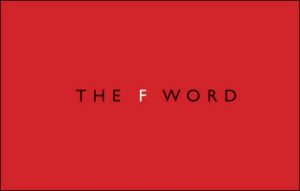 I recently sent an old novel off to reviewers from the ginormous list of indie reviewers. There are so many more reviewers than when the book was first released (in 2006) that I thought, why not? Literally, there were 5 blogs devoted to self-publishing at that time. Now, hundreds. In the back of my mind I wondered if some of the reviewers would have a problem with the language, as this is an issue that I’ve seen come up frequently on review blogs. And lo and behold, this was exactly the response the book got. Some nice reviews, but this was the response:
I recently sent an old novel off to reviewers from the ginormous list of indie reviewers. There are so many more reviewers than when the book was first released (in 2006) that I thought, why not? Literally, there were 5 blogs devoted to self-publishing at that time. Now, hundreds. In the back of my mind I wondered if some of the reviewers would have a problem with the language, as this is an issue that I’ve seen come up frequently on review blogs. And lo and behold, this was exactly the response the book got. Some nice reviews, but this was the response:
One warning I do have to make is that Henry Baum has included a fair amount of strong profanity throughout the novel. Whilst I felt the characters and their attitudes fitted this language, I know that some readers may find this to be rather unappealing.
I very much enjoyed it and I highly recommend it but I must warn you, the F-word is used often so if you don’t like books with a lot of swearing then I think you will not like this book.
I need to start off by saying that the language in this book really held me up for some time. During the first few pages I think I read the F-word used in every part of speech. Seriously… noun, verb, adjective. The whole bit. For me, it was a bit much, even though I know people talk like this often. I managed to keep reading because I knew the story line would be good, I just had to make myself read through the language. Usually my intuitions are right, and they did not disappoint me this time.
The book’s not crazy profane, either. It’s a crime novel about Hollywood – about people who behave badly. It would be odd if there wasn’t profanity.
I don’t mean to single out these reviewers, as I’m grateful they took the time, and plowed through something that they thought was off-putting, but there’s a pattern here. Last night, I was looking at RJ Keller’s Waiting for Spring on Amazon. This is the sum total of one review*:
Before you purchase this, be aware that there is a lot of profanity in it. The story is intriguing but did the author have to use the f-word this much to get the story across?? I think not – I will not read more by this writer.
I am puzzled by this. I get not wanting bad language to be on TV because it can have an influence on kids, but in the privacy of reading a book, what is the problem? Frankly, it’s surprising that the f word still has this kind of resonance. I mean, what do people think when they see a movie like “Pulp Fiction” (very NSFW):
I post that to show that in the world of the web, the f word is a joke: no one cares about it. It’s a punchline. Yet in the indie community, profanity is treated as weird and foreign – when in real life most everybody uses it.
And I think this is actually a problem. Amy Edelman on the Indie Reader Facebook page has asked the question – why indie publishing doesn’t have the respect of indie movies or indie music. And here’s your answer. Indie film and music historically have been more willing to push boundaries. Yet in indie publishing, it often seems to be the opposite. There’s more to “indie” than just the method of publication. And “Pulp Fiction” would hardly qualify as “independent” – it’s a mainstream movie. So indie publishing could actually be said to be more tame than the mainstream.
This isn’t true across the board, of course, but it’s an issue, and it’s potentially slowing down how quickly indie publishing gains credibility with all types of readers. As more writers self-publish, this dynamic will change, but until then the indie revolution is not entirely available to everyone. That’s not really in the spirit of independent writing – it’s not really even in the spirit of mainstream writing either.
*The book also has a lot of five star reviews.
Get an Editorial Review | Get Amazon Sales & Reviews | Get Edited | Publish Your Book | Enter the SPR Book Awards | Other Marketing Services






















I was wondering what the fuck was up with that shit. Why the hell would these bastards fuck up your rating by leaving shitty comments about your fucking language? It’s to the point where a cocksucker can’t even write a motherfucking book without some shitbag bitching about how many fucking times you use the work fuck. Fuck!
I’ll admit to being puzzled at the f-word backlash my book has received. I’ve often wondered if it was because it was marketed as women’s fiction, that perhaps I’d broken some unspoken rule. But after reading about your experiences I’m forced to reconsider.
The notion that self-published writers are being picked on unjustly is ludicrous. The acceptance of “bad language” as part of the culture doesn’t mean that everybody, across the board, accepts it. There are people who will never watch Pulp Fiction, for just that reason. Complaints about language are aimed at movies, at traditionally published books, and anywhere else that it appears. People have a right to their prejudices. They have a right to note that a book might not appeal to some, based on its language. If they go too far and slam the book because of it, regardless of its overal value, then the author just has to suck it up. That’s not the only reason people can use as excuses, and every published writer is going to get hit with some kind of idiocy sooner or later.
Honestly, this is particular to indie publishing. My point isn’t that self-publishers are being singled out – but that the reviewers who cater to this community are more language averse than other reviewers. I don’t really get why that is. I don’t see a lot of movie review blogs ever talking about language – unless they’re reviewing movies for kids. Music blogs don’t care. Review blogs of traditionally published books don’t do it either. So, really, this is a phenomenon specifically seen in the indie book community.
I got the same reactions about “Freak City” and when I went to check there were only seven fucks and three shits. BFD! But I do like Marc Horne’s idea – he put out a “Clean Version” of his “Automatic Assassin” (which I actually preferred, a matter of taste).
Couple of points, though. If you get your stuff out there to a wide audience, you’re going to hear the whole range of reactions, so you’ve got to take it as a positive. In America, there’s a lot of puritanism (most of it coming from the kind of hypocrites who get caught with underage hookers sooner or later) and a whole lot of self-righteousness. Language is one of those nerves. Grammar is another.
As for indie publishing versus film/music, it seems to me it’s a whole different game entirely. From what I see, most so-called indie writers are not rebelling against the industry standards – they just want in. They’re writing the same kind of formulaic, mainstream, conventional stuff (mysteries, sci-fi, paranormal, romance, erotica) that the big publishers are putting out – there seems to be very little “indie” in indie writing. That’s my main problem with the whole scene. It’s mostly about wanting to cash in, be the next Amanda Hocking, and so on.
When they talk about publishers being the “gatekeepers” they mean just that. They want to control the market, be the only players, let only their guys in. The mass of self-publishers are storming those gates and why not? Good for them. Go for it, I say, but I don’t believe for a minute there’s anything “indie” in the same sense as you had in music or film.
Maybe it’s just that people don’t want “different” when it comes to their reading. Maybe they just want more of the same, and if it’s just the same, why should they care where it comes from, whether it’s from Bantam Books or Joe Schmoe?
“From what I see, most so-called indie writers are not rebelling against the industry standards – they just want in.” I agree. If what you want is rebellious, experimental writing, you need to go to the small presses and some university presses. From what I can tell, experimental literature has yet to embrace the indie way of doing things.
Henry, I’ll take your word for it that this is a problem peculiar to the indie book community. I wonder, though, if it isn’t a matter of a lot of mismatches between reviewers and books.
In any one case it could be the fault of the reviewer, in not making it clear what she wants to read, or the author, in not making it clear what she wants read.
I did this myself in not making it clear to reviewers that my book has some major characters who are gay and lesbian. I naively thought their sexual orientation wouldn’t matter because they’re living in an imaginary prehistoric world where homophobia doesn’t exist. (The reviewers who objected were all nice enough, though, to simply not post a review.)
Tom, I think you put it just right. Most indie writers aren’t rebels –“they just want in.” And there’s “very little ‘indie’ in indie writing.”
Although some of us “have been more willing to push boundaries,” as Henry puts it. In my novel, and the next three to come, the reader won’t happen upon a single “dirty” word. Because the author, who greatly enjoyed the first comment above, is a prude? Hardly. It’s because there are no “dirty” words in the world my characters live in. The concept doesn’t exist. That, and a lot of other useless hang-ups, come later, with “civilization.”
This discussion caps a peculiar day for me, as a co-worker told me today that I am too profane at times.
In my book, the characters delve into harsh language and rightfully so as they are dealing with rough subject matter while a few of them can be accurately called a lowlife. Often people say profanity is a result of a lower level of intelligence, but I think of it as language used to deal with people who are incapable of understanding true wit or sarcasm at times.
I can definitely understand Mr. Lichtenberg’s comments regarding hypocritical leanings as well. I see it everyday and that includes my offended co-worker.
@Tom
I was gonna write much the same thing you did. And I’d like to add it kinda annoys me, this “indie” publishing. I never considered this indie publishing thing indie at all. You have a bunch of people outside the in-crowd who all wanna be part of the in-crowd, and have always wanted to be part of the in-crowd, many of them having been rejected by the in-crowd, so they write the same sort of shit, the same urban fantasy, the same teenage vampire love stories, and it all makes me want to barf in their faces. I mean, part of the reason indie filmmakers and indie musicians went indie was THEY DIDN’T FIT IN. AND THEY DIDN’T WANT TO. They wanted to put out groundbreaking stuff, things that were actually a little more honest with the human condition than the contrived set pieces of a movie or music industry. “Indie” publishing doesn’t have any of the same spirit. It’s like a bunch of ugly people who didn’t get invited to the prom, so they crashed it. Good for them, bad for them, I don’t really give a shit. All I know is I’m one disappointed reader. When this ebook thing got big I was excited because I thought I’d start seeing new kinds of stories to buy. But what do I see?
Just look at who sells. YA. Teenage vampire love fiction. The virtual shelves are cluttered with same crap as Barnes & Noble. And, just out of curiosity, does anyone other than me find it disturbing that so many middle-aged women want to read about the sex lives of teenagers? It kind of reminds me of the 80s when Prince was painted as a whack job freak and Michael Jackson was Mr. Mainstream with Disney and Pepsi or coke or tab or whatever it was. Looking back on it, who was the freak now? Who was the real whack job?
I mean, my books have some crude shit in them superficially, but if you ask me the really weird thing is the amount of middle aged women who want to read about a 100 y.o. vampire who fucks a high school girl. In real life most people aren’t cool with a 35 y.o. human man getting it on with a 20 y.o. girl. But make one an immortal bloodsucker then all the sudden it’s the stuff of romance.
I’ve had some problems with a title I released. (The Sexually Adventurous Life of Bob Collins.) The opening line signals the reader that there’s going to be some lowbrow stuff going on by some lowlife characters. But people tell me the story is gross. Good. It was meant to be. At least it’s not another goddamned paranormal romance.
But no one will review this story. It’s too gross and offensive. At least it doesn’t have some 200 y.o. vampire with a broken nose fucking a high school girl.
Great Article Henry, and great comments everybody else.
Reviews are a product of the reviewer’s tastes in material. I have had the same type of warning in reviews of my book that go on to say that “the book is awesome and they can’t wait for the next one”.
I think they only make comments like that to protect THEIR readers as a kind of shield or gate keeper so they don’t have to hear a bunch of shit about “Why didn’t you warn us it was full of profanity?”
What kills me is a lot of readers who might be offended by the word ‘Fuck’ in the story, would really enjoy a steamy tale with lots of descriptive foreplay.
I am guessing that in some cases people want to have sex, they don’t want to hear/read the word unless it involves the act.
Personally I write books for real people. When the shit gets intense, real people say ‘Fuck’. Like I said to my fans in a facebook post the other day. “I don’t tell my characters how to speak, and they don’t tell me how to write.” If the story, character and situation calls for that language, I HAVE TO write it.
Some will love it and some will hate it. For me, I wouldn’t be able to read a romance novel. It is not who I am. When it comes to a heavy thriller or a gritty story, I expect the word ‘fuck’ to be there somewhere. Otherwise, don’t expect me to believe in the characters.
I watched a interview with Joseph Finder while I was writing my first novel. He said that his early work had a lot of profanity and that it turned off some readers, especially if they bought the audio book for a car trip and the kids were in the car. While I highly doubt my books will be in audio anytime soon (other than the Kindle robot reading it), his comments stuck with me. I avoided profanity, but the characters weren’t all that salty anyway. I managed one “asshole” and one “goddamned.” Since everyone is looking for something to pick apart with an indie book, I didn’t want a couple “fucks to do me in.”
To my mind, art should never be about censorship of any kind. But you shouldn’t listen to me b/c my sales are nothing compared to a writer like Joseph Finder. Besides, it’s easy enough to release an abridged PG version of an audiobook – no different than an R rated movie playing on network TV.
The reviewers sound like amateur book reviewers not trying to professional who are also Christians but happen to be trying to be that. But there are worse flaws in book criticism. At a writers’ group I go to I don’t get any comments about swearwords in my writing but there’s two people I always know are going to criticise the writing on the basis that ‘there’s no story’, by which they mean it not a piece of hack shit writing like the crap they normally like to read and they’re not willing to shift themselves towards anything that might be called an avant-garde. As I continually end up saying, if this was an art group rather than a writers’ group we’d still be on still life and abstract expressionism wouldn’t have happened.
Mind you Henry, there is another reason why ‘The Flashlight Reader’ might feel a need to point out profanity, if you read the ‘review policy’ page: “My site is mainly a Middle-Grades and Young Adult literature blog, aimed at readers age 10+.”
May I add a comment from the other side? I am a reader that doesn’t like an overuse of profanity and it isn’t what you think. I’ve known plenty of people where “fuck” was every other word out of their mouth. I’m not skittish of foul language in the real world. And I do agree that it’s appropriate for your average lowlife character. But when I see it in every sentence my brain blurs over it. It becomes a non-word. Think about putting any other word in there and you’d see how the overuse destroys the meaning. So every “fuck” becomes “blah” in my head. It isn’t giving me any new information and it’s crowding the page with nothing. It isn’t the profanity but the overuse/repetition of vocabulary.
So I guess if you have a character that has nothing to say, then it’s a perfect use.
To me, the emptiness of the words ‘fuck’ and ‘fucking’ is a quality that few other words share. It is a form of meta-punctuation. Does one get offended by the repetition of full stops and commas? No. Similarly, if one is in the spirit of the writing then one is not offended by the repetition of this word, in fact it is a skill to be able to repeat a word so many times and have it not only be readable but very enjoyable. There are certainly people who use the ‘fuck’ word badly, but there are others who use it skillfully. One should recognise this difference, and, rather than have a blanket condemnation of the word, instead consider how well it is used, or not. As for it being a word only appropriate to lowlifes, I wouldn’t have said this was so at all, I’m sure his fucking lordship is quite capable of shooting a brace of fucking pheasant.